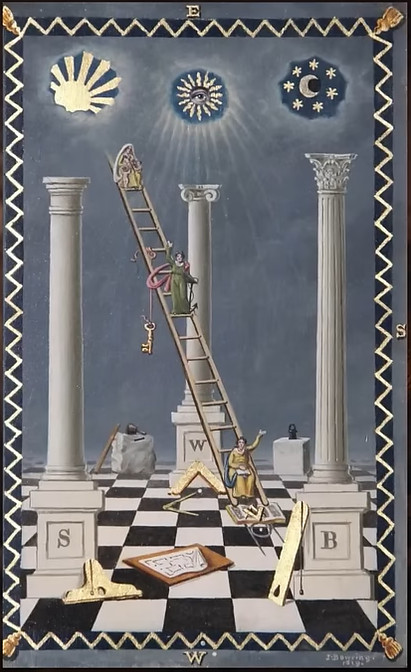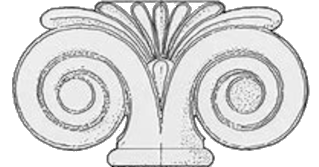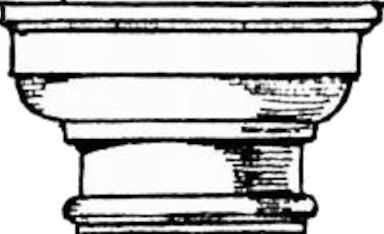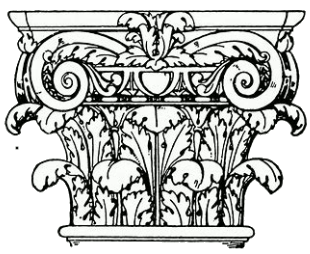|
ARCHITECTURE - PILLARS
There is much significance found in pillars
throughout history:
- Solomon's Temple:
-
Jewish: Looking outside the door to
the East, Boaz was on the left (to the north) and Jachin was
on the right (to the south).
-
Roman/Jewish Josephus: Jachin (He
will establish) stood on the right on the portico in Solomon's
Temple and Boaz (It is strength) was on the left. Both were
made by Hiram Abiff (the Widow's son), a Canaanite.
-
Opposing view: Standing outside
Solomon's Temple and looking east resulting in Jachin to the
north and Boaz to the south.
-
Jachin is the man and represents the Celestial Sphere, and Boaz is the woman representing the terrestrial.
- Khokhmah (Wisdom) and Sophia.
-
Khokhmah was the Hebrew
personification of the female divine. She is understood as
an emanation of God and resonates with the Hebrew Goddess,
Asherah, the sacred tree, who is assailed in the Christian
Bible.
-
To the oldest core of Jewish
culture: “She is a Tree of Life to all who lay hold of
her.”
-
Khokhmah sings, “The one who finds me, finds life.” Like the goddess Asherah, regarded as the partner of Yahweh by the ancient Hebrews, Khokhmah is linked to the pillar. “My throne was in the pillar of cloud,” she declares in Ben Sirach (24:4). In Proverbs 9:1 she builds a house of seven pillars.
-
Wisdom is another form of the Shekhinah, the divine Presence. Both are “expressed in light and glory,” both involved in creation, enthroned in heaven, intermediaries between god and the world, ascending and descending, and winged.
(Thank you Max Max Dashú)
- Female pillar figurines (Asherah).
- Pillars support the veil.
- In Kabbalah, the Sephirot are divided into three Pillars:
-
Pillar of Severity (left) - Mercy.
-
Pillar of Equilibrium (center).
-
Pillar of Mercy (right) -
Severity.
- Five pillars of Islam.
- India Kedareshwar.
- In the Bible Jachin and Boaz represent the Unity of Being and Unity of Thought. The middle pillar is Unity or Equilibrium.
- Enoch placed the knowledge in a pillar of brick to protect from the fire and a stone pillar to protect from the flood.
- Pillar of cloud appeared and guided
Moses and the Israelites during the day, while a pillar of fire showed the way at night.
- Canonic architecture order (3 Greek and
2 Roman) are the five classical orders.
- Vitruvius named the three classic
Greek orders.

Masonic pillars - Greek orders
Religion, Law, Morals |
|
- Left capital: Greek Doric column (Strength - widest,
simplest, feminine, Archaic 750-480BC in western Greece and
mainland and were originally wooden).
parts: abacus,
echinus, necking.
- Center capital: Greek Ionic column
(Wisdom - masculine, Archaic 750-480BC in eastern Greece and were
originally wooden).
parts: volute, egg and dart.
- Right capital: Greek Corinthian column (Beauty - narrowest, most
elaborate, found in classic architecture).
parts:
acanthus leaf, abacus flower.

Proto-Aeolic capital |
|
- Volute capitals from the Levant.
- Omride dynasty in the
1,000 BCE to 586 BCE (First Temple Period).
- Adopted by artistic Assyrians after they invaded Jerusalem
in 701 BCE.
- Tel
Aviv University Professor Oded Lipschits (discovered several
designs).
- Associated with Royal construction.
- Iron age.
- Stylized palm tree motif.
-
Associated with Judah's Longest Hewn Spring Tunnel (Binyamin
Tropper and Daniel Ein-Mor, the IAA archaeologist 2013), 4
miles south of Bethlehem, Palestine.
- Near Eastern, Tree
of Life.
- Tamassos in Cypress used same style.
- The Relationship between Jerusalem's Proto-Aeolic capitals and Absalom's Pillar.
Now Absalom in his lifetime had taken and reared up for himself a pillar, which is in the king's dale: for he said, I have no son to keep my name in remembrance: and he called the pillar after his own name: and it is called unto this day, Absalom's place.
(II Samuel 18:18)
|

Roman Tuscan capital (Etruscan order) |
|
- Refined during the Italian Renaissance.
-
Solidest and least ornate.
- Styled after the Greek Doric
but simpler.

Roman Composite capital |
|
- Combination of Greek Ionic and Corinthian
(82 AD).
- Volutes and acanthus leaves.
-
Renaissance (deemed suitable for the building of churches dedicated to The Virgin Mary or other female saint).
- Suggests richness and grandeur.
|
|